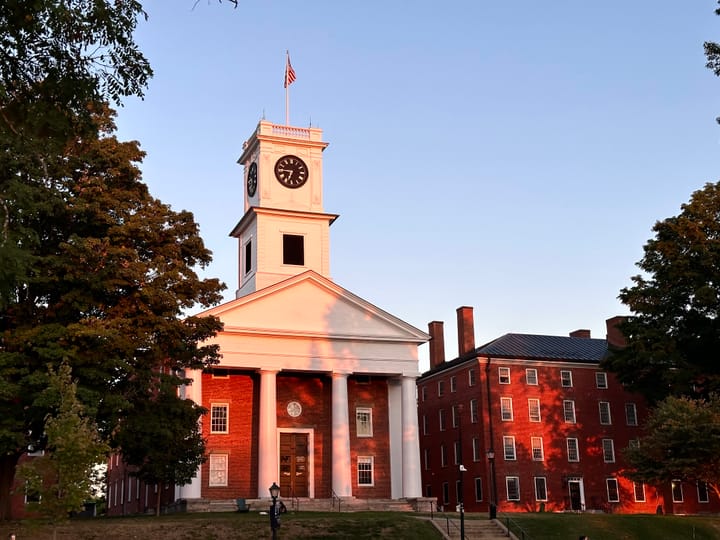Point/Counterpoint Lecture Series Hosts Former President of Merriam-Webster
In the second iteration of this year’s Point/Counterpoint event series, John Morse, the former president of Merriam-Webster, discussed the perils and joys of the dictionary publishing industry, and the power of the dictionary as a source of unification.
The Merriam-Webster dictionary began with Noah Webster’s first draft in the early 19th century. More than two centuries later, the now digitized dictionary includes words like “bussin,” “rizz,” and “GOAT.”
On March 28, John Morse, the dictionary’s former president and publisher, took to Stirn Auditorium to discuss that long history, the decision to include more slang terms, and the centrality of dictionaries in a healthy democracy.
He was joined by Ilan Stavans, professor of Latinx and Latino culture, in what was the second installment of the Point/Counterpoint series.
Morse and Stavans opened the conversation by exploring the history of the Merriam-Webster dictionary, whose founder, Noah Webster, was central to the founding of the college. Webster was motivated to create a dictionary to unite the relatively new nation through language.
The conversation shifted to the relevance of dictionaries for a generation that has grown up with the internet and social media. Though members of Gen Z are unlikely to consult physical dictionaries, Morse highlighted the importance and growth in popularity of Merriam-Webster through their online dictionary. He said that the website gets around 100 million page views, 40 million unique visits, and 25 million unique users every month through the online dictionary.
Despite the growing popularity of the online dictionary, Morse said he fears that a lot gets lost without a print dictionary.
“It’s often a richer experience to have gone to the print dictionary because you see the entire page and not just as if you were looking at an entry through a keyhole,” he said.
Morse then mentioned that a major challenge for the dictionary business is criticism of the way politically contentious words are defined. As a result, dictionaries have been banned from classrooms due to the inclusion of certain words. For example, Texas banned Merriam-Webster because it included sexually explicit language.
Morse also shared a story about a Californian man who threatened to blow up Merriam-Webster’s Springfield headquarters. Because the publisher decided to include another definition to the word woman that encompassed and defined the phrase “transexual woman.”
“Dictionaries do not define or describe things,” Morse emphasized. “They define words. So we were making no comment about ... what a woman ought to be or is.”
Morse said that the definition was not updated to take a political stance but because the previous definition of “woman” no longer made sense given the increasingly common usage of the phrase “transsexual woman.”
“Are there any definitions or inclusions of words that you regret having put in?” Stavans asked.
“It’s gonna be a simple answer to that: No,” Morse said. “The job is to tell the truth about the language. That's what you’re there for.”
“A dictionary is only useful to the extent that someone actually goes and looks at the entry you’ve written,” he continued. “So a real measure of whether to put a word in a dictionary or not is, do we think enough people are going to encounter it, that it’s worth the time and effort to put it into a dictionary.”
Stavans also asked about the dictionary’s neutrality and its power to unify the United States.
In response, Morse pointed back to the origins of American dictionaries like Webster’s, created in the years after the U.S. was founded.
“There was a sense that America was a new nation. It’s a new culture. It should have its own literature. If it’s going to have its own literature. It should have its own language. If it’s going to have its own language. It should have its own dictionary,” he said.
Morse drew a parallel to the present day, as the panel turned to concerns about the health of American democracy.
“We owe it to [the American people] to keep their confidence in us, because if we can keep their confidence in that American institution [Merriam-Webster], maybe they will keep their confidence in other American institutions,” Morse said.
The panel was then opened up to the audience for a Q&A and joined by Peter Sokolowski, editor at Merriam-Webster, who answered questions alongside Morse.
One audience member said, “How do you decide as a dictionary which words to include, which words are important to include, and how do you consider the fact that some groups might view them as more important than other groups?”
“[If] language [is] coming from marginalized communities, especially if it is likely that a broader population is going to encounter them, we get those into the dictionary as quickly as we can,” Morse said.





Comments ()